- Home
- Gerald Durrell
Menagerie Manor Page 2
Menagerie Manor Read online
Page 2
Binturong
Upstairs, the parrots and parakeets salute you with a cacophony of sound: harsh screams, squeakings resembling un-oiled hinges, and cries that vary from ‘I’m a very fine bird’, from Suku, the grey parrot, to the most personal ‘Hijo de puta’ squawked by Blanco, the Tucuman Amazon. Farther along, the genets, beautifully blotched in dark chocolate on their golden pelts, move as quicksilver through the branches of their cage. They are so long and lithe and sensuous that they seem more like snakes than mammals. Next door, Queenie, the tree ocelot, her paws demurely folded, gazes at you with great amber eyes, gently twitching the end of her tail. A host of quick-footed, bright-eyed, inquisitive-faced mongooses patter busily about their cages, working up an appetite. The hairy armadillo lies supine on its back, paws and nose twitching, and its pink and wrinkled stomach heaving as it dreams sweet dreams of vast plates of food. You reflect, as you look at it, that it is about time it went on a diet again, otherwise it will have difficulty in walking, and you make a bet with yourself as to how many visitors that day would come to tell you that the armadillo was on its back and apparently dying: the record to date has been fifteen visitors in one day.
Emperor tamarin
Outside, the clank of a bucket, the burst of whistling, herald the approach of Shep, curly-haired and with a most disarming grin. As his real name is John Mallet it was inevitable that he should be called Shepton Mallet which, in turn, has degenerated into Shep. You walk up the broad main drive with him, past the long 12-foot-high granite wall ablaze with flowering rock plants, and down to the sunken water-meadow where the swans and ducks swim eagerly to welcome him as he empties out the bucket of food at the edge of the water. Having ascertained from Shep that none of his bird charges have during the night sickened or died or laid eggs, you continue on your tour.
Blotched Genet
The Bird House is aburst with song and movement. Birds of every shape and colour squabble, eat, flutter and sing, so that the whole thing resembles a market or a fairground alight with bright colours. Here a toucan cocks a knowing eye at you and clatters his huge beak with a sound like a football rattle; here a black-faced lovebird, looking as though he had just come from a minstrel show, waddles across to his water-dish and proceeds to bathe himself with such vigour that all the other occupants of the cage receive the benefit of his bathwater; a pair of tiny, fragile diamond doves are dancing what appears to be a minuet together, turning round and round, bowing and changing places, calling in their soft, ringing voices some sort of endearments to each other.
You pass slowly down the house to the big cage at the end where the touracous now live. The male, Peety, I had hand-reared while in West Africa. He peers at you from one of the higher perches and then, if you call to him, he will fly down in a graceful swoop, land on the perch nearest to you and start to peck eagerly at your fingers. Then he will throw back his head, his throat swelling, and give his loud, husky cry: ‘Caroo ... Caroo ... Caroo ... coo ... coo ... coo.’ Touracous are really one of the most beautiful of birds. Peety’s tail and wings are a deep metallic blue, while his breast, head and neck are a rich green, the feathering so fine and shining that it looks like spun glass. When he flies, you can see the undersides of his wings, which flash a glorious magenta red. This red is caused by a substance in the feathers, called turacin, and it is possible to wash it out of the feathers. Place a touracou’s wing feather in a glass of plain water, and presently you will find the water tinged with pink, as though a few crystals of permanganate of potash had been dissolved in it. Having dutifully listened to Peety and his wife sing a duet together, you now make your way out of the Bird House.
Dodging the exuberant welcome of the chimpanzees, who prove their interest in your well-being by hurling bits of fruit and other less desirable substances – with unerring accuracy through the wire of their cage, you walk to the Reptile House. Here in a pleasant temperature of 80 degrees the reptiles doze. Snakes regard you calmly with lidless eyes, frogs gulp as though just about to succumb to a bout of sobs, and lizards lie draped over rocks and tree-trunks, exquisitely languid and sure of themselves. In the cage which contains the Fernand skinks I had caught in the Cameroons, you can dig your hands into the damp, warm soil at the bottom of it and haul them out of their subterranean burrow, writhing and biting indignantly. They have recently shed their skins, and so they look as though they have been newly varnished. You admire their red, yellow and white markings on the glossy black background, and then let them slide through your fingers and watch as they burrow like bulldozers into the earth. John Hartley appears, tall and lanky, bearing two trays of chopped fruit and vegetables for the giant tortoises. The previous night had been a good feeding one, he tells you. The boa-constrictors had had two guinea pigs each, while the big reticulated python had engulfed a very large rabbit, and lies there bloated and lethargic to prove it. The horned toads, looking more like bizarre pottery figures than ever, had stuffed themselves on baby chickens, and, according to their size, the smaller snakes were busily digesting white rats or mice.
Bearded Lizard
Horned Toads
Round the back of the house are some more of the monkey collection that have just been let out into their outdoor cages: Frisky, the mandrill, massive and multi-coloured as a techni-coloured sunset, picks over a huge pile of fruit and vegetables, grunting and gurgling to himself; farther along, Tarquin, the cherry-crowned mangabey, with his grey fur, his mahogany-coloured skull-cap and his white eyelids, goes carefully through the fur of his wife, while she lies on the floor of the cage as though dead. Periodically he finds a delectable fragment of salt in her fur and pops it into his mouth. One is reminded of the small boy who had witnessed this operation with fascinated eyes and had then shouted: ‘Hi, Mum, come and see this monkey eating the other one.’
Up in their paddock the tapirs, Claudius and Claudette, portly, Roman-nosed and benign, play with Willie, the black and white cat, who guards the aviaries near by from the rats.
Willie lies on his back and pats gently at the whiffling, rubbery noses of the tapirs as they sniff and nuzzle him. Eventually tiring of the game, he would rise and start to move off, whereupon one of the tapirs would reach forward and tenderly engulf Willie’s tail in its mouth and pull him back, so that he would continue this game of which they never seemed to tire. In the walled garden the lions, butter-fat and angry-eyed, lie in the sun, while near them the cheetahs would be languidly asprawl amid the buttercups, merging with the flowers so perfectly that they became almost invisible.
At ten o’clock the gates open and the first coach-loads of people arrive. As they come flooding into the grounds, everyone has to be on the alert, not, as you may think, to ensure that the animals do not hurt the people, but to ensure that the people do not hurt the animals. If an animal is asleep, they want to throw stones at it or prod it with sticks to make it move. We have found visitors endeavouring to give the chimpanzees lighted cigarettes and razor-blades; monkeys have been given lipsticks which, of course, they thought were some exotic fruit and devoured accordingly, only to develop acute colic. One pleasant individual (whom we did not catch, unfortunately) pushed a long cellophane packet full of aspirins into the chinchilla cage. For some obscure reason one chinchilla decided that this was the food it had been waiting for all its life and had eaten most of it before we came on the scene: it died the next day. The uncivilised behaviour of some human beings in a zoo has to be seen to be believed.
Now, there might be any one of 50 jobs to do. Perhaps you go to the workshop where Les, with his craggy face and bright eyes, is busy on some repair work or other. Les is one of those people who are God’s gift to a zoo, for no job defeats him and his ingenuity is incredible. He is like a one-man building firm, for he can do anything from welding to dovetailing, from cementing to electrical maintenance. You discuss with him the new line of cages you are planning, their size and shape, and whether they should have swing doors, or whether sliding doors would be more convenient.
Having thrashed out this problem, you remember that one of the giant tortoises had to have an injection. On your way to deliver this, you pass an excited crowd of North Country people round the mandrill cage, watching Frisky as he stalks up and down, grunting to himself, presenting now his vivid, savagely beautiful face, and now his multi-coloured rear to their eyes.
‘Ee,’ says one woman in wonderment, ‘you can’t tell front from back.’
Lunchtime comes and so far the day has progressed smoothly. As you sit down to eat, you wonder if there will be a crisis during the afternoon; will the ladies’ lavatories overflow, or, worse still, will it start to rain and thus put off all the people who are intending to visit the Zoo? Lunch over, you see that the sky is, to your relief, still a sparkling blue. You decide to go down and look at the penguin pond, for which you have certain ideas of improvement.
You scuttle surreptitiously out of the house, but not surreptitiously enough, for both your wife and your secretary catch you in rapid succession and remind you that two reviews and an article are a week overdue and that your agent is baying like a bloodhound for the manuscript you promised him eighteen months previously. Assuring them, quite untruthfully, that you will be back very shortly, you make your way down to the penguins.
On the way you meet Stefan grinning to himself, and on asking him what the joke is, he tells you that he was in one of the lions’ dens, cleaning it out, when, glancing over his shoulder, he was surprised to see a visitor standing there, using the place as a lavatory.
Mandrill
‘What are you doing?’ inquired Stefan.
‘Well, this is the gents’, isn’t it?’ replied the man peevishly.
‘No, it isn’t. It’s the lions’ den,’ replied Stefan.
Never had an exit been so rapidly performed from a public convenience, he told me.
Having worked out a complicated but very beautiful plan for the penguin pool, you then have to work out an equally complicated and beautiful plan for getting the scheme passed by Catha, the administrative secretary, who holds the Zoo’s purse-strings in a grip so firm it requires as much ingenuity to prise money out of it as it would do to extract a coin from a Scotsman’s sporran. You march to the office, hoping to find her in a sunny, reckless mood, instead of which she is glowering over an enormous pile of ledgers. Before you can start extolling the virtues of your penguin pond idea, she fixes you with a gimlet green eye and in a voice like a honey-covered razor-blade informs you that your last brilliant idea came to approximately twice what you had estimated. You express bewilderment at this and gaze suspiciously at the ledger, implying, without saying so, that her addition must be wrong. She obligingly does the sum in front of you, so that there will be no argument. Feeling that this precise moment is not perhaps the best one to broach the subject of the penguin pond, you back hastily out of the office and go back into the Zoo.
You are spending a pleasant ten minutes making love to the woolly monkeys through the wire of their cage, when suddenly your secretary materialises at your elbow in the most unnerving fashion, and before you can think up a suitable excuse she has reminded you once more about the reviews, the article and the book, and has dragged you disconsolately back to your office.
As you sit there racking your brains to try to think of something tactful to say about a particularly revolting book that has been sent to you for review, a constant procession of people appears to distract your attention. Catha comes in with the minutes of the last meeting, closely followed by Les who wants to know what mesh of wire to put on the new cage. He is followed by John who wants to know if the mealworms have arrived, as he is running short, and then Jeremy appears to tell you that the dingoes have just had 11 pups. I defy any writer to write a good review when his mind is occupied with the insoluble problem of what to do with 11 dingo pups.
Eventually, you manage to finish the review and slip once more into the Zoo. It is getting towards evening now and the crowds are thinning out, drifting away up the main drive to the car park, to wait for their buses or coaches. The slanting rays of the sun floodlight the cage in which the crowned pigeons live: giant powder-blue birds with scarlet eyes and a quivering crest of feathers as fine as maidenhair fem. In the warmth of the setting sun they are displaying to each other, raising their maroon-coloured wings over their backs, like tombstone angels, bowing and pirouetting to one another and then uttering their strange, booming cries. The chimpanzees are starting to scream peevishly, because it is nearing the time for their evening milk, but they pause in their hysterical duet to utter greeting to you as you pass.
Up in the Small Mammal House the night creatures are starting to come to life, creatures that all day long have been nothing but gently snoring bundles of fur: bushbabies with their enormous, perpetually horrified eyes, creep out of their straw beds and start to bound about their cages, silently as thistledown, occasionally stopping by a plate to stuff a handful of writhing mealworms into their mouths; pottoes, looking like miniature teddy-bears, prowl about the branches of their cage, wearing guilty, furtive expressions, as though they were a convention of cat burglars; the hairy armadillo, you are relieved to see, has roused itself out of its stupor and is now the right way up, puttering to and fro like a clockwork toy.
Downstairs, with growls of satisfaction, the gorillas are receiving their milk. Nandy likes to drink hers lying on her stomach, sipping it daintily from a stainless steel dish. N’Pongo has no use for this feminine nonsense and takes his straight from the bottle, holding it carefully in his great black hands. He likes to drink his milk sitting up on the perch, staring at the end of the bottle with intense concentration. Jeremy has to stand guard, for when N’Pongo has drained the last dregs he will just simply open his hands and let the bottle drop, to shatter on the cement floor. All round, the monkeys are gloating over their evening ration of bread and milk, uttering muffled cries of delight as they stuff their mouths and the milk runs down their chins.
Bushbaby
Potto
Walking up towards the main gate you hear the loud ringing cries of the sarus cranes: tall, elegant grey birds with heads and necks the colour of faded red velvet. They are performing their graceful courting dance in the last rays of the sun, against a background of blue and mauve hydrangea. One will pick up a twig or a tuft of grass, and then, with wings held high, will twirl and leap with it, tossing it into the air and prancing on its long slender legs, while the other one watches it and bows as if in approval. The owls are now showing signs of animation. Woody, the Woodford’s owl, clicks his beak reprovingly at you, as you peer into his cage, and over his immense eyes he lowers blue lids with sweeping eyelashes that would be the envy of any film star. The white-faced Scops owls that have spent all day pretending to be grey decaying tree stumps, now open large, golden eyes and peer at you indignantly.
Shadows are creeping over the flower-beds and the rockery. The peacock, as exhausted as an actor at the end of a long run passes slowly towards the walled garden, dragging his burnished tail behind him and leading his vacant-eyed harem towards their roosting place. Sitting on top of the granite cross that surmounts the great arch leading into the courtyard is our resident robin. He has a nest in a crevice of the wall half hidden under a waterfall of blue-flowered rock plants. So, as his wife warms her four eggs, he sits on top of the cross and sings his heart out, gazing raptly at the western sky where the setting sun has woven a sunset of gold and green and blue.
Woodford’s Owl
As the light fades, the robin eventually ceases to sing and flies off to roost in the mimosa tree. All the day noises have now ceased and there is a short period of quietness before the night cries take over. It is started inevitably by the owls – beak-clicking and a noise like tearing calico from the white-faced Scops owls, a long, tremulous and surprised hoot from the Woodford’s owl, and a harsh, jeering scream from the Canadian homed owls. Once the owls have started, they are generally followed by the Andean fox who sits forlornly in t
he centre of his cage, throws back his head and yaps shrilly at the stars. This sets off the dingoes in the next cage and they utter a series of gently melodious howls that are so weird and so mournful they make you want to burst into tears. Not to be outdone, the lions take up the song – deep, rasping, full-throated roars that tail off into a satisfied gurgle that sounds unpleasantly as though they have just found a hole in the wire.
In the Reptile House, snakes that had been so lethargic all day now slide round their cages, bright-eyed, eager, their tongues flicking as they explore every nook and cranny for food. The geckoes, with enormous, golden eyes, hang upside down on the roof of their cage, or else with infinite caution stalk a dishful of writhing mealworms. The tiny, yellow and black corroboree frogs (striped like bulls’ eyes and the size of a cigarette butt) periodically burst into song: thin, reedy piping that has a metallic quality about it, as if someone were tapping a stone with a tiny hammer. Then they relapse into silence and gaze mournfully at the ever-circling crowd of fruit flies that live in their cage and form part of their diet.

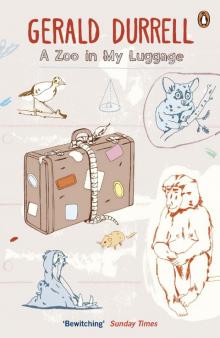 A Zoo in My Luggage
A Zoo in My Luggage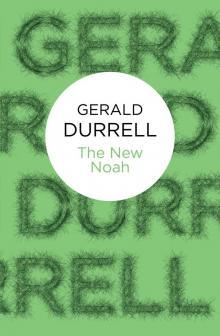 The New Noah
The New Noah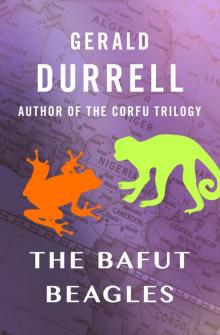 The Bafut Beagles
The Bafut Beagles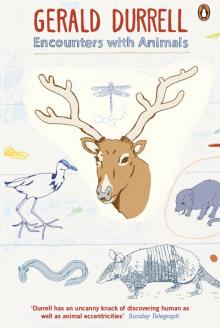 Encounters With Animals
Encounters With Animals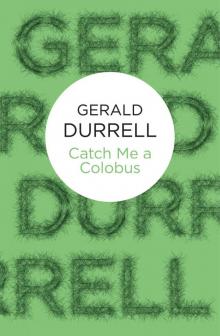 Catch Me a Colobus
Catch Me a Colobus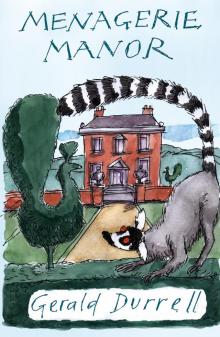 Menagerie Manor
Menagerie Manor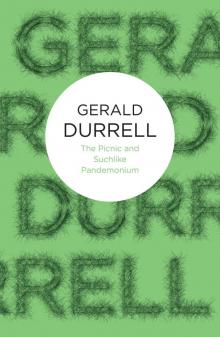 The Picnic and Suchlike Pandemonium
The Picnic and Suchlike Pandemonium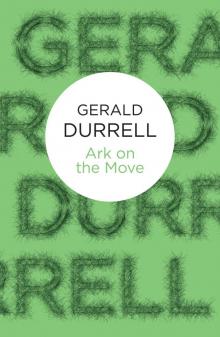 Ark on the Move
Ark on the Move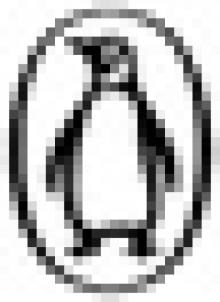 My Family and Other Animals
My Family and Other Animals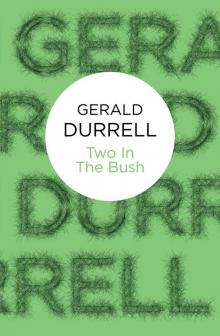 Two in the Bush (Bello)
Two in the Bush (Bello) The Stationary Ark
The Stationary Ark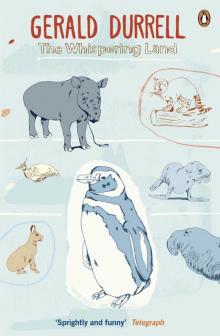 The Whispering Land
The Whispering Land Three Singles to Adventure
Three Singles to Adventure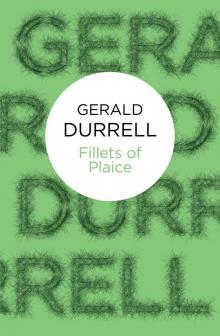 Fillets of Plaice
Fillets of Plaice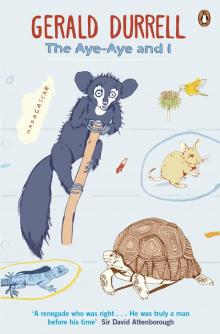 The Aye-Aye and I
The Aye-Aye and I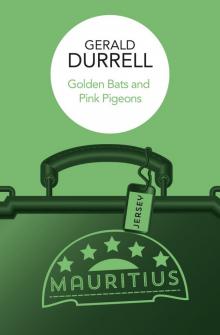 Golden Bats & Pink Pigeons
Golden Bats & Pink Pigeons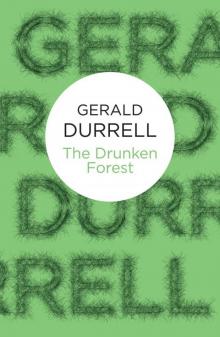 The Drunken Forest
The Drunken Forest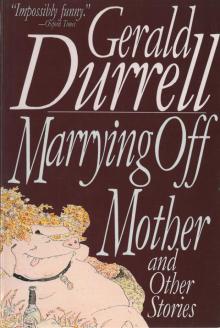 Marrying Off Mother: And Other Stories
Marrying Off Mother: And Other Stories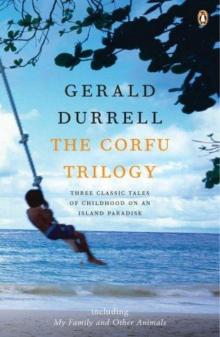 The Corfu Trilogy (the corfu trilogy)
The Corfu Trilogy (the corfu trilogy)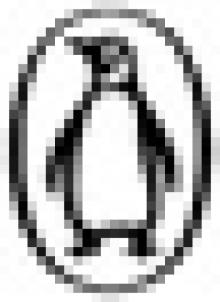 The Corfu Trilogy
The Corfu Trilogy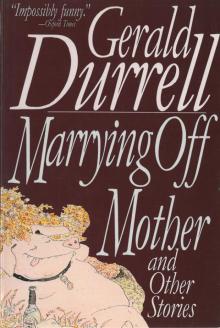 Marrying Off Mother
Marrying Off Mother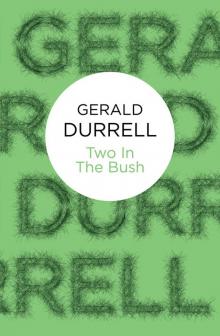 Two in the Bush
Two in the Bush